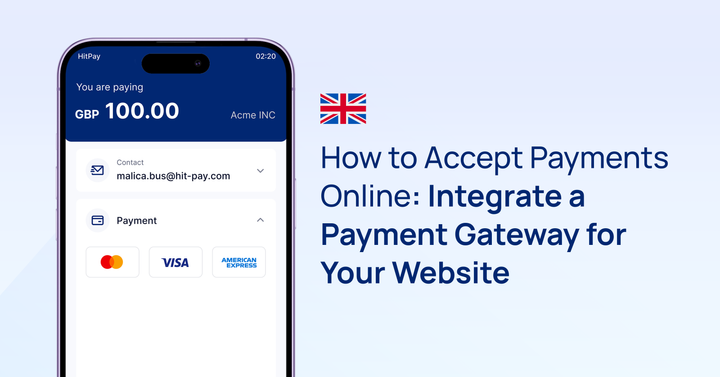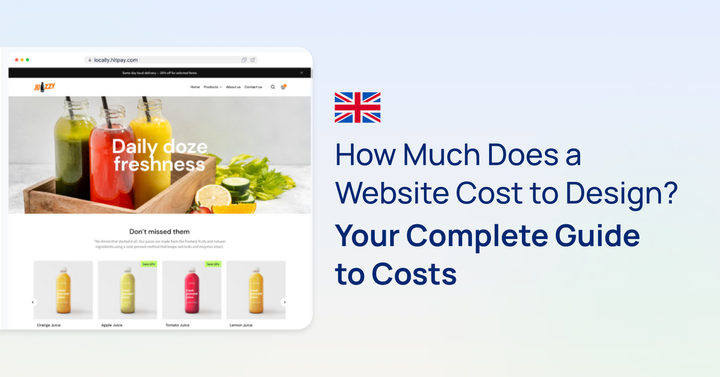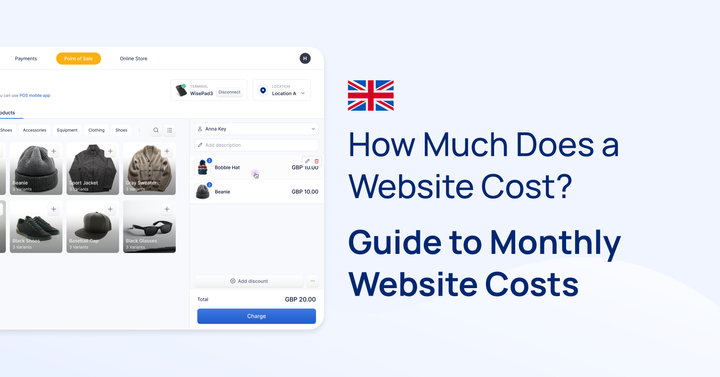How Much Does a Website Cost? UK Pricing Guide
This guide breaks down the costs of building a website in the UK, covering factors like design, hosting, and maintenance. It offers insights into various pricing options, including custom and template-based designs, helping businesses plan and budget effectively for their online presence.
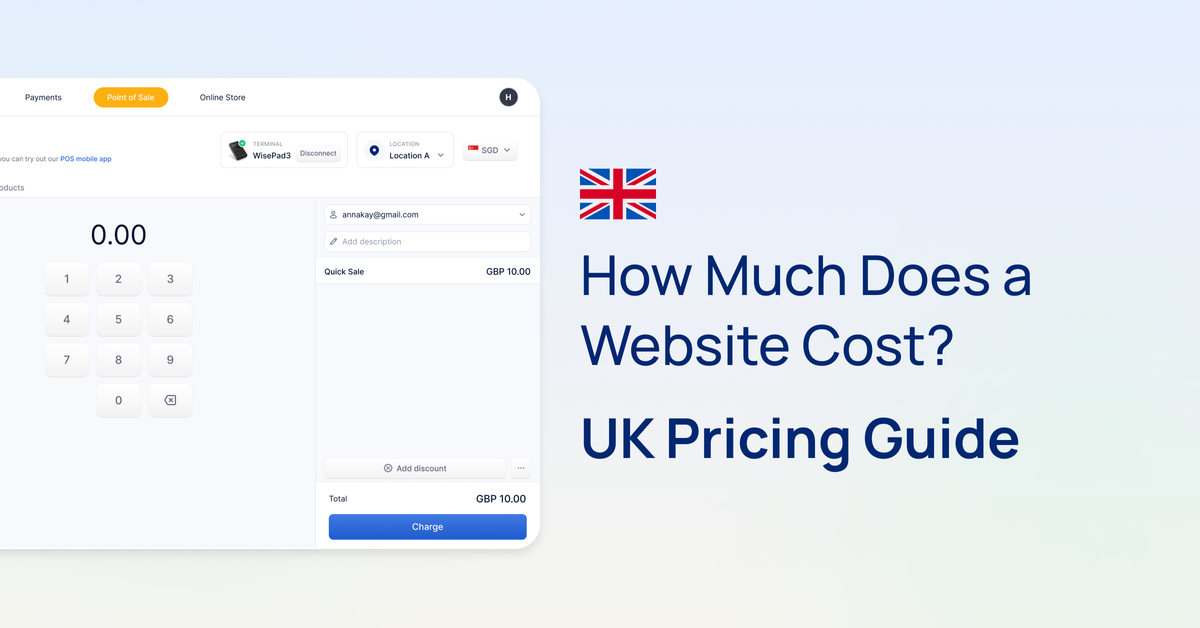
Building a website can seem overwhelming, especially with so many costs to consider—from domain registration and hosting to design and ongoing maintenance.
Whether you’re planning a basic site or a more complex online store, this guide will help you understand the various costs involved in the process. We’ll break down different pricing options and provide real examples, so you can make informed decisions for your web project.
Plus, we’ll introduce you to HitPay’s all-in-one website builder, which offers an intuitive platform to create and customise your store, manage inventory, and optimise for SEO, all while saving time and reducing complexity in setting up your online presence.
Key Takeaways
- The cost of building a website can vary significantly based on design and functionality.
- Brochure sites generally incur lower website costs compared to e-commerce sites.
- Choosing a custom design often increases the website design cost compared to template-based solutions.
- Additional expenses like maintenance, hosting, and security should be factored into your budget.
What Affects the Cost to Build a Website in the UK?

Determining the cost of building a website involves several important factors, such as the type of website, the complexity of design, hosting services, and ongoing maintenance needs.
These factors can significantly impact your overall budget. With more than four in five (81%) shoppers conducting online research before making a purchase, having a well-designed and functional website is more critical than ever.
By understanding these elements, you can plan more effectively, choose the right options for your business, and avoid unexpected costs in creating your online presence.
Website Type: Brochure Site vs. E-Commerce Site
The cost of building a website largely depends on the type of site you need. A simple brochure site is generally more affordable, as it primarily serves to provide information about your services and requires less development work.
In contrast, e-commerce websites are more complex, involving features like transaction processing, inventory management, and user accounts, which require more time and resources to build.
The actual costs will depend on the specific project details, the web development team's expertise, the region, and the level of customisation required.
Custom vs. Template-Based Design Costs
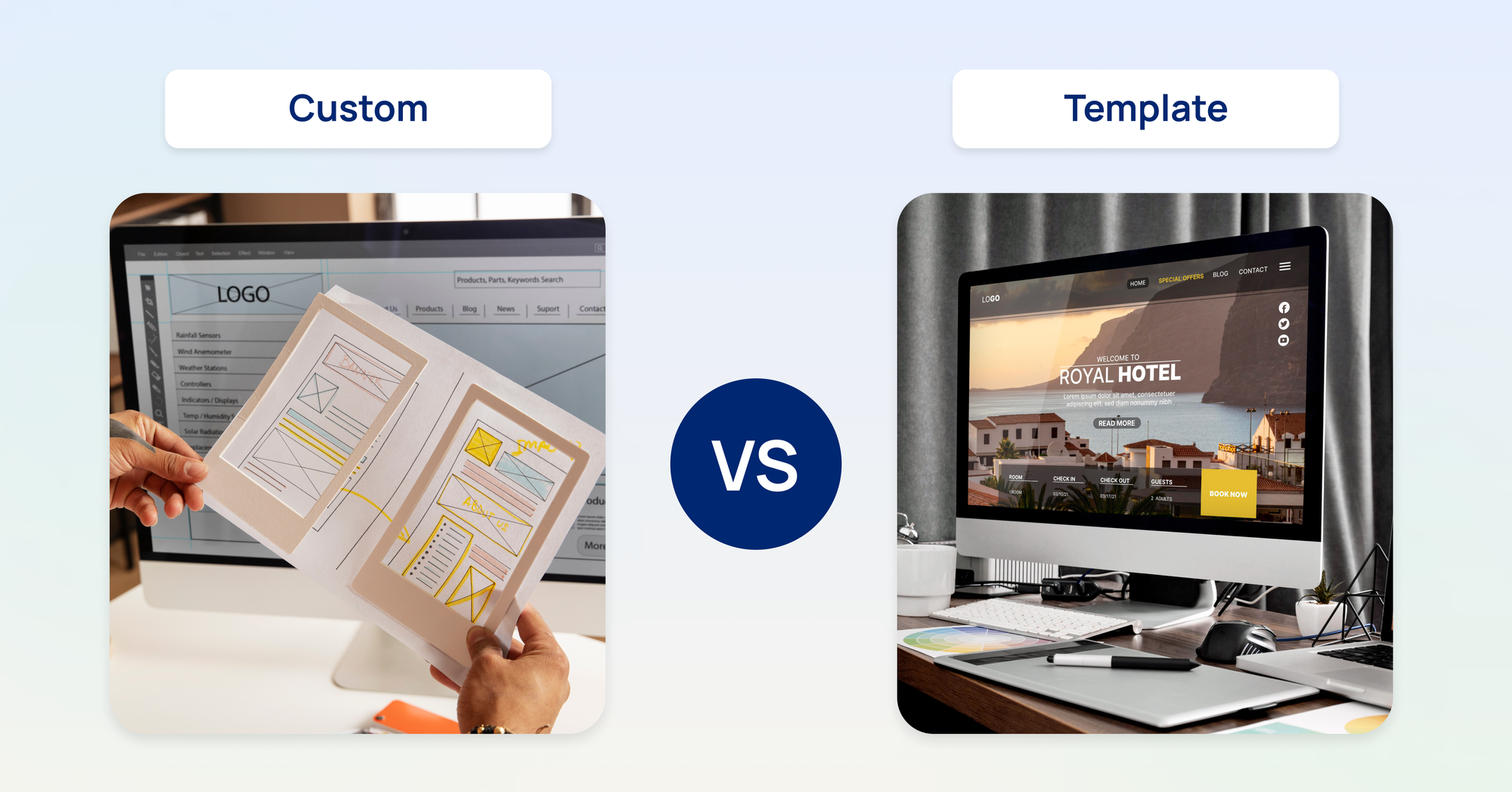
Deciding between a custom design and a template-based design can significantly impact your budget.
- Custom designs are generally more costly because they require specialised skills, unique layouts, and tailored development to create a website that perfectly aligns with your brand identity and specific needs.
- Template-based designs, on the other hand, use premade layouts and themes, making them a more affordable option. They provide a quicker and easier way to get your website up and running, often at a fraction of the cost of custom designs.
When planning your budget, it's important to consider whether a fully customised site or a template-based approach better suits your goals and resources.
The Role of Functionality and Features in Website Pricing
The functionality and features you choose for your website will also influence the overall cost. Basic features, such as contact forms or social media integration, typically come at a lower cost.
With an estimated 5.17 billion social media users worldwide in 2024, integrating social media into your site is more important than ever for reaching a broader audience.
However, more advanced functionalities—such as user registration, e-commerce capabilities, or dynamic content—require additional development work and resources, which can substantially increase expenses.
Carefully consider the essential features that your website needs to achieve its purpose and goals. Aligning your spending with these priorities will help ensure you get the most value from your investment.
How Much Does It Cost to Build a Website in the UK?
Understanding the costs of building a small business website is essential for effective budgeting. Several factors can influence the final price, and this guide will help you navigate the typical expenses for creating a website in the UK.
Typical Website Costs for Small Businesses
The cost of a basic small business website typically ranges from £100 to £5,500, depending on the features and customisations required. To save on costs, many small businesses opt for DIY website builders, which can range from free to around £43 per month.
HitPay offers a cost-effective solution for SMEs by providing a free online store builder. This allows businesses to create an e-commerce website without the need for expensive custom development. The builder is user-friendly, requiring no technical skills, which aligns with the cost-saving benefits of DIY website builders.
Web Design Costs: UK Pricing Breakdown
In the UK, freelance web designers typically charge between £25 and £70 per hour, while agencies may charge more. A professionally built website generally starts at around £4,000, depending on the complexity of the project and the reputation of the developer or agency. These rates reflect the level of expertise, time commitment, and scope of work needed to meet specific business needs.
Understanding the Total Cost to Build a Website in the UK
Building a website is not just about the upfront design cost. There are ongoing costs that can impact your budget. It's key to know these extra costs for a successful online presence.
Additional Costs to Consider: Maintenance, Hosting, and Security
After your website goes live, it's important to budget for ongoing maintenance, hosting, and security to keep it functional and secure. Here’s a breakdown of potential expenses:
- Maintenance Services: Expect to pay between £50 to £150 per hour for website maintenance, depending on the complexity and frequency of updates needed.
- Hosting Services: Website hosting costs can range from £30 to £500 annually, based on factors like your site's traffic and specific hosting requirements.
- Security Measures: Essential security features, such as SSL certificates and DDoS protection, can significantly impact your budget but are crucial for safeguarding your site and building trust with visitors. With 40% of cyber attacks aimed at small businesses, investing in strong security measures is vital to protect your business from potential threats.
By planning for these ongoing expenses, you can ensure that your website remains secure, reliable, and provides a positive experience for both you and your visitors.
DIY Website Builders vs. Hiring a Professional: Cost Comparisons
Deciding what the best website builder is for you, or whether to hire a professional designer, is a crucial choice for your business. Here’s a breakdown of the potential costs:
DIY website builders are more affordable upfront but may lack the advanced features and customisation that a professional designer can provide. While hiring a professional can result in a higher-quality website, it comes with a significantly higher cost.
Alternatively, consider using HitPay’s free online store builder, which combines the affordability of DIY solutions with powerful e-commerce features, secure payment processing, and a user-friendly design. This way, you can create a professional website without the high cost, tailored specifically to your business needs.
Costs for Ongoing Support and Website Maintenance
Keeping your website running involves more than just the initial build; there are ongoing costs you need to plan for to ensure your site remains effective and secure. These costs may include:
- Regular Website Updates: To keep your website functioning smoothly, it's important to regularly update your software, plugins, and themes. This helps prevent bugs, improve performance, and add new features that enhance the user experience.
- Security Patches: Cyber threats are constantly evolving, so regular security patches are essential to protect your site from vulnerabilities, malware, and hacking attempts. This includes updating SSL certificates, applying security patches, and implementing DDoS protection.
- Content Management: Fresh, engaging content is vital for attracting and retaining visitors. Ongoing content management involves regularly adding new blog posts, product descriptions, images, or videos, which requires time and potentially additional costs if you outsource this work.
- Technical Support: Even the best websites encounter issues from time to time. Budgeting for technical support ensures you have access to experts who can resolve problems quickly, whether it’s a broken link, a server issue, or a complex technical glitch.
Understanding these ongoing expenses is crucial for keeping your website secure, functional, and competitive. Planning ahead for these support needs will help ensure your website remains up-to-date, user-friendly, and aligned with your business goals.
How to Budget for Your Website Build in the UK: Tips for Small Businesses

For small businesses, setting a website budget is crucial to establishing a strong online presence. Begin by defining a realistic budget that aligns with your business goals, target audience, and the functionalities your website needs. This approach helps ensure that your investment effectively supports your objectives.
Here are some budgeting tips to help you maximise your spending:
- Identify Must-Have Features Early: Determine the essential features your website needs from the start to avoid costly changes or additions later.
- Explore Development Options: Research various development options, from affordable DIY website builders to professional web design agencies, to find the solution that best fits your budget and requirements.
- Consider Long-Term Value vs. Short-Term Savings: While low-cost solutions may offer immediate savings, investing in a custom website can provide significant long-term benefits, especially in building a unique brand identity and ensuring scalability. With 55% of first impressions of a brand being visual, a professionally designed website can create a stronger, more memorable impact on potential customers.
Remember to consider the total cost of ownership for your website, which goes beyond initial design and development. Factor in ongoing expenses like hosting, maintenance, security updates, and content management.
Planning for these ongoing costs can help you avoid unexpected expenses and ensure a smoother launch and operation of your website.
Factors to Consider When Building a Website in the UK
Creating a successful website in the UK requires attention to several key areas. Prioritising mobile responsiveness and user experience is essential, as they play a major role in attracting and retaining visitors.
Additionally, understanding the costs associated with SEO and content creation is crucial for performing well in UK search engine rankings.
The Importance of Mobile Responsiveness and User Experience
92.3% of internet users access the internet using a mobile phone, so ensuring your site is fully optimised for phones and tablets is essential. A seamless user experience enhances navigation and engagement, which can ultimately lead to higher customer retention and conversions.
While incorporating mobile-friendly features might increase upfront costs, the investment is worthwhile, helping your site stand out in a competitive online landscape.
SEO and Content Costs: Optimising for UK Search Engines
Investing in SEO is critical for driving traffic to your website. Effective SEO strategies involve costs related to keyword research, technical site audits, and building backlinks. High-quality content is equally important, as it plays a key role in SEO success.
Allocating a budget of £500 to £2,000 for quality content can significantly enhance your site’s visibility and engagement in search results. Prioritising strong content and SEO practices will provide a solid foundation for your business to grow online.
Get Started With HitPay's Secure Online Website Builder
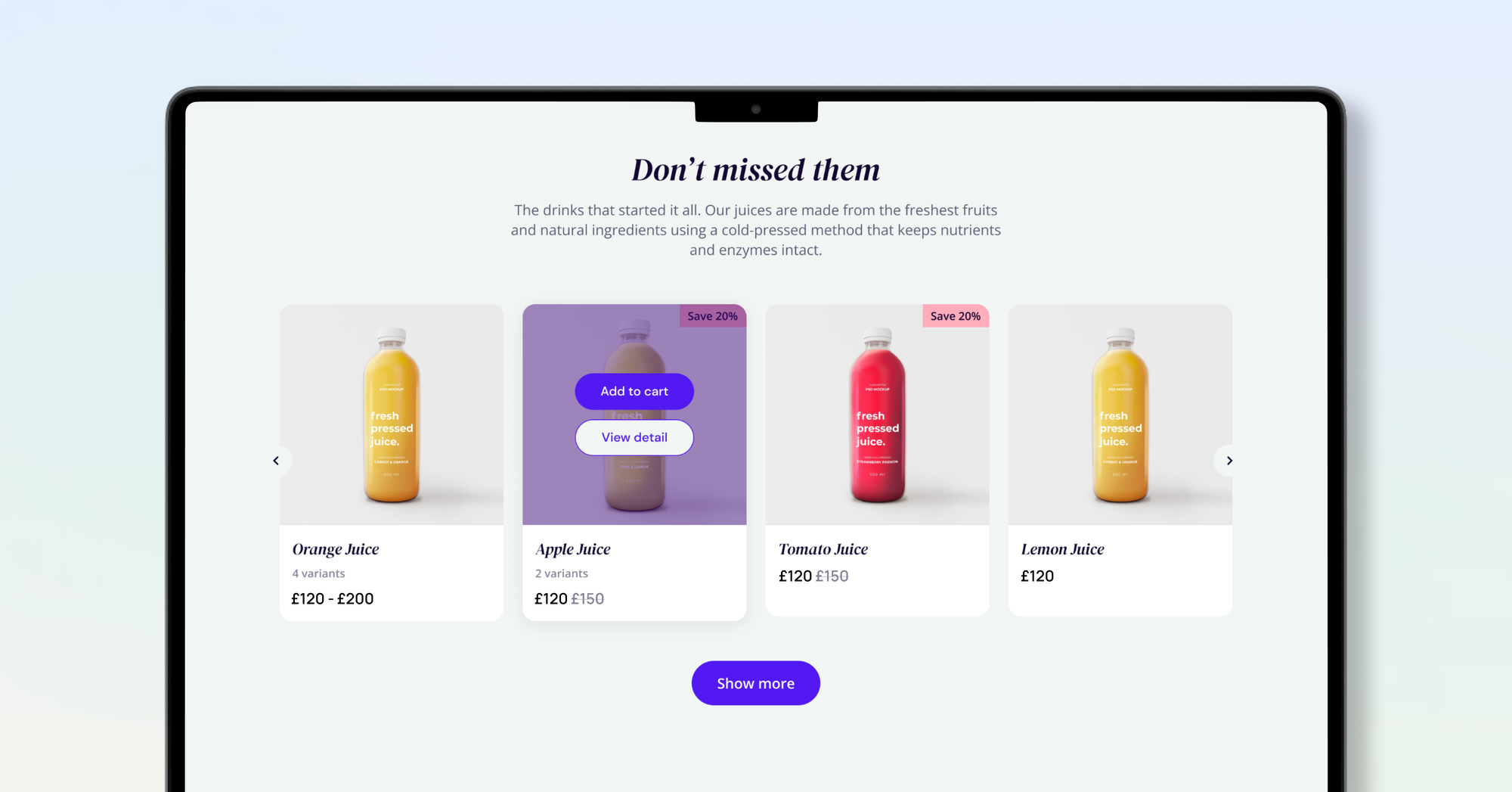
Setting an effective website budget is essential for establishing a strong online presence. From design and development to maintenance and security, it's important to consider all costs to ensure your budget aligns with your business goals.
Start by clearly defining what you need from your website — including its type, key features, and target audience. This understanding will help you create a budget that supports your objectives and provides a solid foundation for growth.
Deciding whether to hire a professional web designer or use a DIY website builder depends on your specific needs and resources. A professional can offer more advanced features and ongoing support, while DIY templates may be a cost-effective option for simpler sites. Carefully evaluate these options to make the best choice for your business.
Try HitPay’s Online Website Builder for free today!
If you're a customer who has questions about paying with HitPay, feel free to contact us on our website.
FAQs
What factors influence the cost of website design?
The cost of a website depends on its type, design, and what it can do. Whether you choose a custom design or a template also affects the price.
What should I consider when budgeting for my website?
Think about your business goals and what you need from your website. Consider the balance between upfront costs and long-term benefits.
What is the average cost of hiring a UK-based web developer or agency?
Hiring a UK web developer can be from £4,200 to over £63,000. This depends on the project's complexity and the agency's standing.
How much does it cost for basic website maintenance?
Basic upkeep costs £50 to £150 an hour. This varies by the services needed and the expert's skills.
Is mobile responsiveness important for my website?
Yes, it's crucial for your site to work well on mobiles. Many users visit websites on their phones, which affects how they interact with your site.

